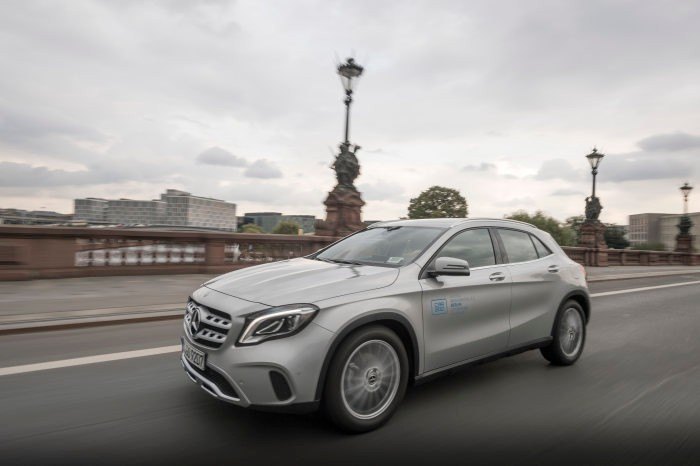Daimler Might Expand Its 'Mobility Services' Through an Unlikely German Ally

Automotive soothsayers have foreseen the coming Armageddon, where private car ownership vanishes and we’re all ferried around in robotic taxis or rental vehicles, and manufacturers have taken their divinations to heart. Either that, or the opportunity to diversity already successful companies is too tempting a prospect to pass up. As such, we’ve seen “mobility” become the new industry buzzword — used as a fill-in for electric vehicles, autonomous development, and ride-sharing/hailing programs.
Hoping to expand its own mobility services, Daimler has announced an openness to seek broader alliances just days after BMW Group bought out its rental car partner, Sixt, from their joint car-sharing program DriveNow. That sets the stage for a peculiar partnership, as the two German automakers have a long, competitive history with each other — one which sometimes results in passive-aggressive behavior.
That’s not to suggest the two automotive giants are incompatible. Despite some tongue-in-cheek jabs and friendly competition, the pair seem to be able to cooperate with one another. Besides, this is a new era where mobility is everything and you can’t let rivalries stand in the way of progress.
Dieter Zetsche, chief executive for Daimler and Mercedes-Benz, told analysts on Friday that he was willing to combine his company’s mobility services with a rival automaker. “To the extent that it would be more successful in a partnership, we would consider that,” Zetsche clarified.
Daimler has several car-sharing and hailing platforms, including Moovel, MyTaxi, and Car2Go. All of which, Chief financial Officer Bodo Uebber explained, the company is looking to expand upon. “We do not exclude that we go for external funding,” Uebber added.
Moovel is an app Daimler claims is necessary, since transportation is “on the edge of disruption.” It allows customers to book transit passes via phone but also connects them to MyTaxi and Car2Go. While Moovel is currently developing a software toolkit, called RideTrap, which allows users to book everything from train tickets to bicycle rentals, only Car2Go has a physical presence in the United States.
The ride-sharing service is easiest to spot in larger cities, identifiable by the blue and white Smart ForTwos wearing the company’s logo. But the hourly car rental service hasn’t taken off in the states as Daimler would have liked, primarily because the tiny vehicles used in its fleet are less useful outside of densely populated urban areas.
As a result, Car2Go (which functions similarly to ZipCar) decided to expand its footprint and vehicles by gradually replacing the ForTwos with the Mercedes-Benz CLA and GLA. While it might sound like the program is a failure, global membership crept up 30 percent last year, with about a third of its customers coming from North America.
Meanwhile, BMW has DriveNow in Europe and ReachNow in North America. Both companies function similarly to Car2Go, with the main differencing being you’ll have BMW or Mini-branded vehicles on offer. With the two companies now wholly-owned subsidiaries, the German automaker can begin considering a strategic partnership. In fact, that may have been why BMW bought out Sixt in the first place — as Daimler and BMW have been discussing a broader car-sharing and driverless taxi alliance for a while now.
[Source: Reuters] [Images: Daimler AG]

A staunch consumer advocate tracking industry trends and regulation. Before joining TTAC, Matt spent a decade working for marketing and research firms based in NYC. Clients included several of the world’s largest automakers, global tire brands, and aftermarket part suppliers. Dissatisfied with the corporate world and resentful of having to wear suits everyday, he pivoted to writing about cars. Since then, that man has become an ardent supporter of the right-to-repair movement, been interviewed on the auto industry by national radio broadcasts, driven more rental cars than anyone ever should, participated in amateur rallying events, and received the requisite minimum training as sanctioned by the SCCA. Handy with a wrench, Matt grew up surrounded by Detroit auto workers and managed to get a pizza delivery job before he was legally eligible. He later found himself driving box trucks through Manhattan, guaranteeing future sympathy for actual truckers. He continues to conduct research pertaining to the automotive sector as an independent contractor and has since moved back to his native Michigan, closer to where the cars are born. A contrarian, Matt claims to prefer understeer — stating that front and all-wheel drive vehicles cater best to his driving style.
More by Matt Posky
Latest Car Reviews
Read moreLatest Product Reviews
Read moreRecent Comments
- Lorenzo The Longshoreman/philosopher Eri Hoffer postulated "Every great cause begins as a movement, becomes a business, and ends up as a racket." That pretty much describes the progression of the United Auto Workers since World War II, so if THEY are the union, the answer is 'no'.
- Redapple2 I think I ve been in 100 plants. ~ 20 in Mexico. ~10 Europe. Balance usa. About 1/2 nonunion. I supervised UAW skilled trades guys at GM Powertrain for 6 years. I know the answer.PS- you do know GM products - sales weighted - average about 40% USA-Canada Content.
- Jrhurren Unions and ownership need to work towards the common good together. Shawn Fain is a clown who would love to drive the companies out of business (or offshored) just to claim victory.
- Redapple2 Tadge will be replaced with a girl. Even thought -today- only 13% of engineer -newly granted BS are female. So, a Tadge level job takes ~~ 25 yrs of experience, I d look at % in 2000. I d bet it was lower. Not higher. 10%. (You cannot believe what % of top jobs at gm are women. @ 10%. Jeez.)
- Redapple2 .....styling has moved into [s]exotic car territory[/s] tortured over done origami land. There; I fixed it. C 7 is best looking.



































Comments
Join the conversation
"an Unlikely German Ally" At first glance I thought "Axis of Evil"